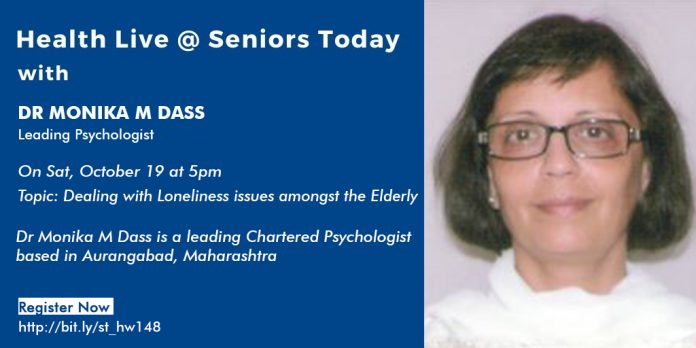Dr Monika Dass is a Chartered Psychologist, a Chartered Scientist and an Associate Fellow of the British Psychological Society, UK. Professionally, she has counselled around 15,000 individuals in a span of 20 years and has published several papers in both Indian and international journals.
A trained pianist and vocalist from the Trinity College of Music, London, Dr Dass has influenced many lives with the joyful learning of music. She has been actively involved in several popular musicals such as The Sound of Music, Joseph and His Amazing Technicolour Dreamcoat and so on…with her expertise in developing children through drama. She firmly believes that any extracurricular activity can help tap into one’s potential and bring out the best in an individual.
Loneliness is a topic which affects all of us. When we are young, we do not realise how lonely it will get as we grow old and become an adult.
Most grandchildren are not aware how lonely their grandparents are.
It is a very touchy subject for the elderly because many seniors perhaps live alone. There may be others who might live with their family but still feel lonely because of busy family members or because they cannot give enough time to you.
There are various aspects to loneliness.
However, Dr Dass has made an interesting observation and says that even the younger generation in todays’ time is lonely. Making loneliness a pandemic.
All of us need to be kept busy. You need to have a schedule- from the moment you wake up till the time you go to bed.
And this needs to be a fairly easy but planned schedule so you can have an idea about what you will be doing during the day and yet a schedule says enough to work around and add activities.
It can be anything from starting your day with a hot cup of tea to yoga to aerobics to meditation, reading, etc. You can also add things like planning your finances, keeping a slot for catching up with your friends.
Having a schedule doesn’t mean that you do the same thing everyday. You need to do a variety of things and activities.
In the west, you see/ meet the elderly, in their 80s, living on their own and running their own home. This has its own advantages. It gives you something to do.
So, if you’re fit and able, Dr Dass suggests that you continue to do things you enjoy doing around the house.
The key to not feeling lonely is to have a plan of action in hand for yourself.
Another thing, and this one is rather difficult to do, is to force yourself to get out to meet people. Especially if you live alone and don’t have anyone to talk to at home during the day.
This interaction can be with anybody- from the shopkeeper to the grocer to your friends.
The key is to have a conversation with someone. Or else you could find yourself living a robotic existence where you might spend days without a decent and meaningful human interaction.
You also tend to feel lonely when you are more dependent on someone, that someone can be your spouse, your family member. It is important to become more independent.
Loneliness also affects your physical well being. It can also lead to early deaths.
1 in every 3rd person is affected by loneliness. We are social animals who prefer to be around people. But in today’s fast paced world it is difficult to find time, even with your children and grandchildren.
For this, it is your children and grandchildren who will have to make the effort of taking out time, even if it is only 30 minutes of their day to chat with you and spend time with you and vice versa.
Lonely people tend to not talk about themselves, they are shy, tend to not open up, they do not wish to share their life or experiences. With such individuals you need to initiate a conversation with them.
You can keep loneliness at the bay by:
- Practicing yoga
- Meditation
- Going for long walks
- Meeting up with friends
- Going for a movie or a concert
- Spending quality time with your family and grandchildren. Try to speak to your grandchildren, take interest in who their friends are, what their schedule is like, are they facing any issues that need to be resolved? Your ideas could help them stabilise themselves.
There is a difference between an introvert and a lonely person. An introvert is a person who doesn’t share things too easily with the world. They are not unhappy people, but tend to keep to themselves however loneliness is a feeling.








